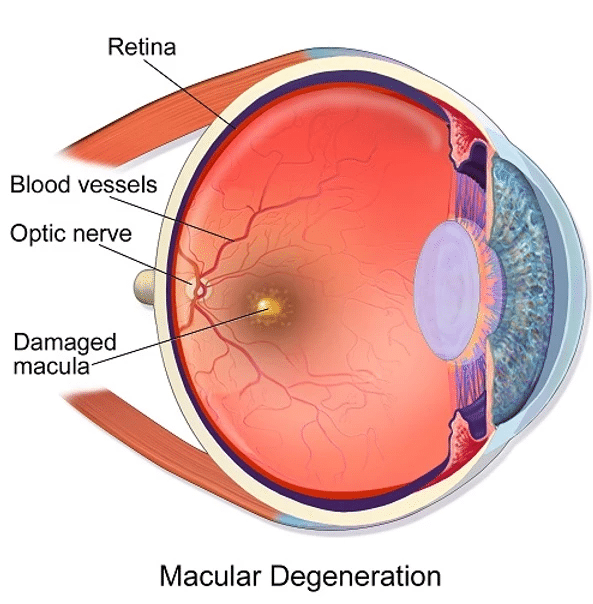Why has my central vision got worse?
Sight loss and vision problems can be troubling at any age. As we get older, we expect some natural decline in vision quality, but the sudden onset of a sight problem will always cause great concern for a patient.
If your vision is declining in quality slowly over time, then your optician will ensure you have the right sight correction aids to manage your vision loss. However, the sudden loss of sight, especially in one part of the eye such as the centre, can indicate something more serious. Here are some of the main causes of central sight loss.

Posterior Vitreous Detachment (PVD)
This is a condition that usually affects older people, and it is linked to aging. Over time, the gel-like fluid surrounding the eye can shrink and pull away from the retina. This might manifest as an increase of floaters, which move around on the eye and appear as spots, squiggles or ‘cobwebs’. However, it can also lead to the loss of sight or reduced sight quality in patches of the eye. If you are experiencing blurred or lost central vision, always consult a specialist eye doctor.
Detached retina
PVD can indicate a far more serious problem: retinal detachment. This is more common in short-sighted people, as there is already pressure on the eye, but it can happen to anybody. Retinal detachment is a medical emergency and left untreated it can lead to permanent blindness. It is caused when the retina peels away from the eye, with fluid caught behind it. Sufferers may notice black spots in their field of vision, including central vision loss, and many experience flashes of light in the eyes as well. If you suspect a retinal detachment, see your local A&E department.
Macular degeneration
Macular degeneration is an age-related sight disorder which often appears gradually, but in some cases can have a very sudden onset. It is similar to and sometimes mistaken for glaucoma, where pressure in the eye leads to blindness. Both conditions are often noticed as a loss of central vision, or through the appearance of blurred or black spots in front of the eyes. There is no cure for macular degeneration and it often leads to total or near blindness, but vision can be maintained to some extent through special sight aids and the use of sight techniques.
Cataracts
Cataracts are cloudy spots which appear in the centre of the eye, affecting vision and reducing sight capabilities. Blurred vision, loss of central vision and loss of colour sight are among the early noticeable symptoms of cataracts. Surgery is often very effective in correcting cataracts and restoring sight, but without treatment, they can lead to permanent blindness.
Eye injury
If the decline in central sight came on suddenly after a head or eye trauma, you should seek immediate medical advice. Concussion can often lead to sight disturbance and could indicate a more serious injury, such as swelling or a bleed on the brain. Damage to the eye can also reduce sight drastically. Accidents that can injure the eye include direct trauma to the eye or face, but also exposure to bright lights or intense heat.
Related articles





